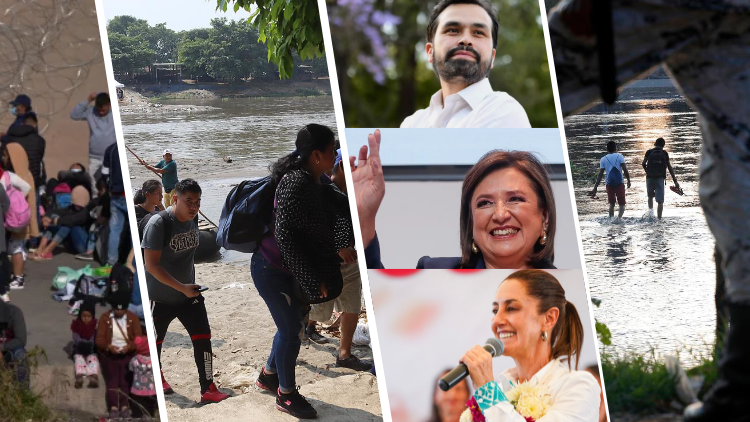Migration
Election Countdown: the Migration Phenomenon in Mexico

The migratory flow to Mexico has experienced a notable increase in recent years, reaching a record 782,176 events of people in an irregular migratory situation in 2023, according to data from the Mexican migratory authority. This phenomenon is mostly composed of Venezuelan, Honduran and Guatemalan nationals.
Given this reality, it is not only imperative to analyze the socioeconomic and human security factors underlying this phenomenon and develop effective strategies to address it, but it is also essential to scrutinize with delicacy the campaign proposals presented by the three candidates. Each of these proposals, like brushstrokes on a canvas, offers a unique and insightful vision on how to address the migration challenges facing Mexico.
The big missing issue: what do the candidates propose?
_______________________________________________________________________________________________
According to candidate Claudia Sheinbaum's speech, coordination and cooperation -based on respect for national sovereignty- emerge as essential elements to face the migration crisis in Mexico. For Sheinbaum, greater investment in the places of origin of migrant groups is a fundamental part of the long-term solution.
Therefore, she proposes strengthening the industrial capacity of the southern border to expand employment opportunities and labor integration, hoping to generate better living conditions that will ideally reduce the need for people to migrate. Taking into account the promises of expansion of the inter-oceanic train, it is expected that this significant change in the economic nature of the southern region will promote a positive impact in Tapachula and Comitán de Domínguez, main red hotspots for the concentration of migrant groups in their entry to Mexico.
Highlight: Sheinbaum's strategy seeks to address both the consequences and causes of migration through economic development and regional cooperation, offering a comprehensive vision to address the migration crisis in Mexico. She highlights the importance of deeper engagement and greater dialogue and negotiation with the presidents of Guatemala and the next president of the United States.
_______________________________________________________________________________________________
For her part, Xóchitl Gálvez pledges to open an ongoing dialogue with the United States to improve the situation of undocumented Mexicans, proposing measures such as the extension of work visas and the revision of discriminatory policies. In addition, he presents a 15-point plan that addresses issues of security, violence and support for SMEs, including the possibility of a binational program for business development in Mexico and the United States.
In terms of education for migrants, Galvez proposes measures such as distance education for training and certification of trades, the strengthening of community centers for teaching Spanish and English, and the creation of a binational scholarship and school exchange program. His focus on education seeks to improve the skills of migrants and turn them into skilled labor, thus contributing to the economic development of Mexico and the United States.
Highlight: Gálvez's proposal stands out for highlighting the importance of a coordinated immigration policy between federal, state and municipal agencies in Mexico. She also advocates for open communication between authorities and the Mexican diaspora, promoting an intercultural approach with sensitivity towards vulnerable groups such as indigenous and Afro-Mexicans.
_______________________________________________________________________________________________
Jorge Álvarez Máynez stresses the need to strengthen Mexico's discourse in multilateral forums and to cooperate with international organizations to regain greater influence in these spaces. His proposal focuses on three key elements: demilitarizing migration control tasks, replacing migratory stations with dignified shelters, and establishing a stronger dialogue with the United States.
Therefore, Máynez's proposal emphasizes the importance of international diplomacy and seeks to humanize the treatment of migrants, proposing concrete measures to strengthen regional cooperation and guarantee respect for human rights in migration policy.
Highlight: Álvarez Máynez advocates for a humanitarian approach in migration policy through the cohesion of actions applied between the northern and southern border. In addition, he stresses the importance of establishing a symmetrical relationship with the United States, decreasing trade dependence in order to diversify trade relations and strengthen Mexico's position in the international arena with other countries.
Actual proposals?
The coincidence of this year's electoral cycle in Mexico and the United States highlights the relevance of the migration agenda, which largely defines the bilateral relationship between the two countries. The next Mexican administration will face significant challenges, including the need to address the lack of inclusive economic development, precarious labor conditions, poverty and insecurity, which will require cohesive and multifaceted migration strategies. The effective implementation of these strategies will depend largely on the next president's ability to address the complex economic, social and security challenges associated with migration.
